9 Effective Ways To Remove Maggots In Trash Cans
As a participant in the Amazon Services LLC Associates Program and other affiliate programs, Easy Homemade Life may collect a share of sales or other compensation from the links on this page. This comes at no additional cost to you, and all the prices and availability are accurate at the time of publishing.
Maggots in trash cans are not only unpleasant to look at, but they also produce a foul odor. It’s no surprise that dealing with them is something nobody looks forward to. Unfortunately, maggot infestations are a common issue in households, especially during warmer months.

If you find yourself faced with maggots in your garbage can, the most important thing to do is to act quickly before it turns into a health risk. It may be hard to find some cleaning motivation, but the good news is that I’ve discovered effective methods to eliminate these pests and to prevent their return.
From natural remedies to preventive measures, follow these effective tips to make sure that your home is fresh, hygienic, and maggot-free! Let’s get started.
Why Do Maggots Infest Garbage?
One hot summer day, as I was tackling some oil stains in our driveway, I noticed an unpleasant smell coming from our outdoor trash cans. Upon checking, I was horrified to see critters swarming our garbage! I knew I had to act fast. I also knew that if I wanted to effectively get rid of the maggots, I had to understand what makes them thrive in such an environment.
I discovered that food waste, particularly rotting meat scraps and other food, attracts flies and maggots like a magnet. Add other smelly trash like dirty diapers and your trash will be even more of a maggot magnet. The humidity and moisture from the warm weather worsens the odor, attracting even more of the critters. The enclosed, dark, and moist environment inside trash cans also makes the perfect breeding ground for maggots, which makes them develop at a rapid rate.
Additionally, improper waste management and lack of regular cleaning also contribute to the development of maggots in trash cans. Female flies can easily access and lay their eggs in bins that are uncovered household trash or garbage bags that are not properly sealed, so make sure to always keep the lids tightly closed and seal all your garbage bags securely.
Also, you’re allowing organic residue to build up if you don’t clean your garbage bins and trash container regularly. Cleaning disrupts the life cycle of maggots by removing their breeding sites and food sources, so be sure your garbage bins are clean before garbage pick-up or trash collection day.
Does Rice Turn Into Maggots?
I get this question a lot, so I wanted to provide an answer here. The answer is no, rice does not turn into maggots. Rice is a grain, therefore it is impossible to transform into a live insect. However, I totally get why there are plenty of speculations around this.
Rice is an ideal breeding ground for insects. Once the eggs hatch, they feed on the grains and reproduce. However, the “maggots” that you typically see in rice aren’t the same as the ones that infest your garbage – they’re actually the larvae of Indian meal moths, which is very similar-looking to fly larvae.
If your rice grains are infested with meal moth maggots, you can spread the grains evenly on a sheet tray then run a hair dryer on high heat over your rice 2 to 3 times to kill the eggs and critters. Alternatively, you can place the grains in a resealable bag and freeze them at 0 degree Celsius, which will also kill the maggots. Be sure to thoroughly wash your rice before cooking!
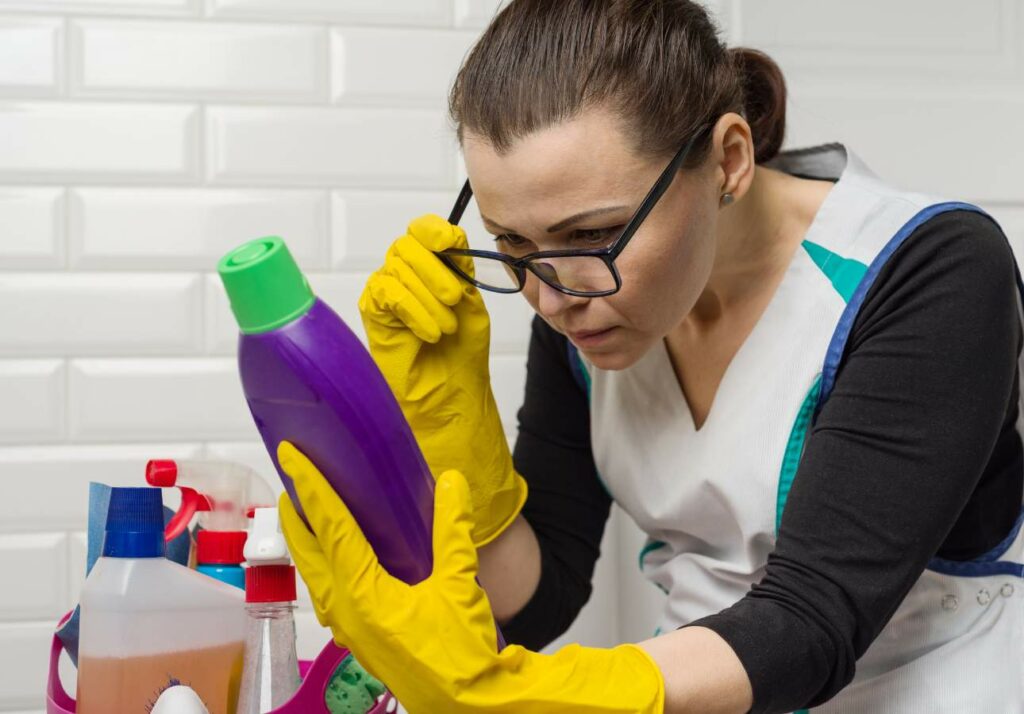
How To Kill Maggots In Trash Cans
Cleaning is very therapeutic for me. If you’ve been following my blog, you know that I love sharing cleaning how-to’s, such as how to clean a self-clean oven, a Whirlpool dishwasher, a dehumidifier, a grill, quartz countertops, and even corrosion off a car battery. I discovered these effective methods through trial and error, that’s why when I found out that we had a maggot infestation in our garbage, I took action right away.
Using my cleaning experience and expertise, I found the best ways to remove maggots in trash cans, using both natural remedies and chemical solutions to ensure effective and long-lasting results. Be sure to remove the trash bag from your trash bin beforehand and make sure that no loose debris is left inside the bin.
Once done, you can now start tackling the maggots using a suitable method from the ones I will list below, depending on the size of your trash can and how much maggots are there.
Does Bleach Kill Maggots?
Another question that I get asked a lot is if bleach kills maggots. The answer is yes, bleach is a powerful maggot and insect repellant and it’s an effective way of killing and getting rid of maggots.
Just combine equal parts of bleach and hot water in a container, pour the bleach solution into your garbage can, then close the lid. The solution will suffocate and kill the maggots, at the same time disinfect the area. Allow the solution to sit for at least 30 minutes. Remove the lid, drain the solution, and wash it with another dose of bleach to help prevent future infestations.
Other Chemical Solutions
Aside from bleach, there are other chemical solutions you can use to stop a maggot problem. It’s important to wear protective clothing and gear like gloves and a mask when using these chemicals as they can be toxic to humans.
All-Purpose Cleaners
Various household cleaners can also be used to remove maggots in trash cans. Mix one part of an all-purpose cleaner with four parts of boiling water then pour the mixture into your garbage bin. You can substitute the cleaner with dish soap. Dish soaps contain borax, an ingredient that effectively kills the eggs of flies.
Carburetor Cleaner
If you’re a vehicle owner, you probably have some carburetor cleaner lying around. Carb cleaners are a powerful cleaning agent and contain toxic chemicals, so be sure to practice caution when using it and to wear protective gear. Don’t mix it with other cleaners, too!
To kill maggots using a carb cleaner, combine 1 cup of the cleaner with 2 gallons of hot water then pour inside your trash can. Allow for the solution to sit for 1 hour. The fumes from the solution should kill the maggots.
Insect Sprays Or Insecticides
Bug sprays, insect sprays or insecticides that work on adult flies will work on maggots. Simply spray the inside of your trash can generously with an insect spray and wait for 30 minutes. The maggots should be gone within this time.
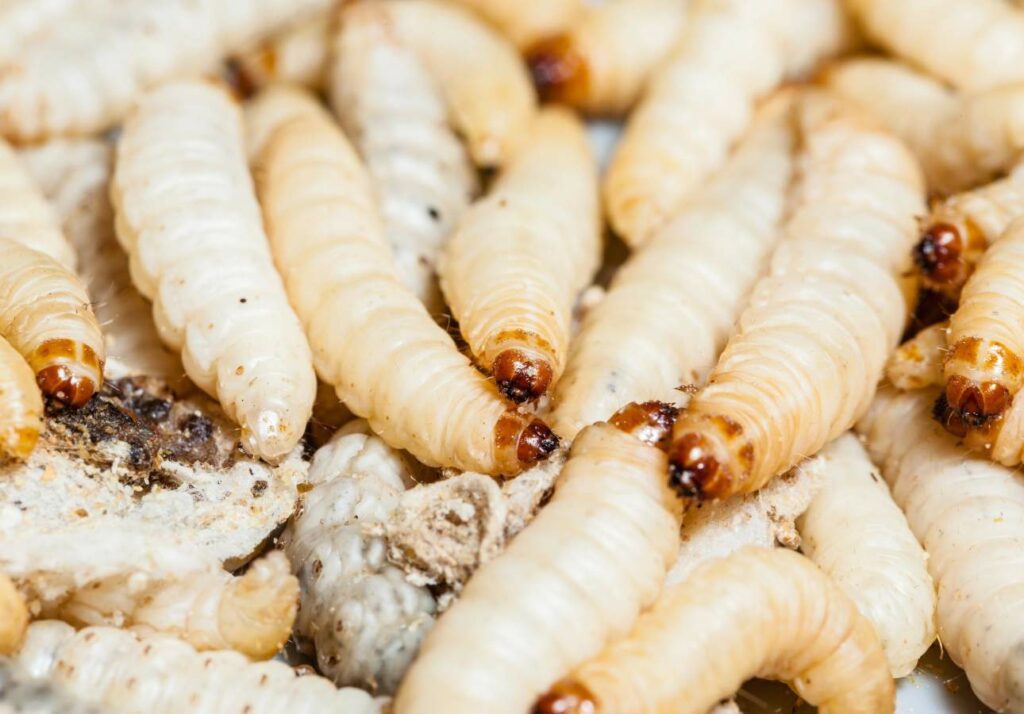
Natural Methods
I’m pro-natural, so of course I had to find chemical-free solutions and natural ways to get rid of maggots. These are products that you can easily find at home or are easily available in stores. Natural methods are also ideal if you’re not comfortable handling toxic chemicals.
Boiling Water
Perhaps the easiest way to kill maggots is by pouring boiling water on them. Just fill your garbage bin with boiling water and let it sit for at least 30 minutes. The high temperatures of the water will kill the maggots and get rid of the remaining eggs.
However, this method is ideal for smaller trash bins, unless you can produce hot water in a large quantity that can fill your large bin. Also, be careful not to burn yourself!
Salt and Lime
Salt is also an effective maggot-killer. To make it even more potent, combine it with lime, which will dry out the maggots and kill them. Calcium hydroxide (lime) is available in most hardware stores.
Just combine equal parts of salt and lime and sprinkle the mixture inside your garbage bin, focusing on areas where the maggots breed. Add more if needed. Wait for at least 1 hour then wash off with hot water.
Vinegar Solution
Vinegar is one of the most versatile and effective natural cleaning solutions there is. I use it to make my homemade carpet cleaner, DIY tanning bed cleaner, and many other natural cleaning solutions around my home.
I wasn’t surprised when I found out that it’s also effective on maggots. Just mix 1 part vinegar with 2 parts hot water to create a powerful solution that will not only stop the maggot infestation but will also disinfect and deodorize your trash can. Spray the inside of your garbage bin with the solution. Wearing gloves, scrub the inside using the part vinegar and part water mixture. Allow it to sit for 30 minutes then rinse with hot water. Let the bin dry thoroughly before lining with a garbage bag.
Cinnamon Powder Solution
Yes, you read it right – cinnamon powder is an effective maggot-buster because maggots can’t tolerate the smell of the spice. Simply mix cinnamon powder with tap water and pour the mixture into your bin. However, this method can take up to 6 hours before you see results. If you have a small trash can, combine cinnamon powder with scalding water and this will kill the maggots and eggs upon contact.
Diatomaceous Earth
Diatomaceous earth is a non-toxic material that you can purchase from hardware stores. It is a sharp matter, it is excellent at cutting up and killing bugs and pests, including maggots. Its dry nature will also dry out the maggots and kill them.
Sprinkle diatomaceous earth, or apply with a powder duster, all over your garbage bin, then wait for a few minutes. I buy this bulk bag that comes with a powder duster. The tool is super handy and helps deliver a thin layer all around. Sprinkle again when you see maggots moving. Repeat the process until all flies, maggots, and eggs are killed.
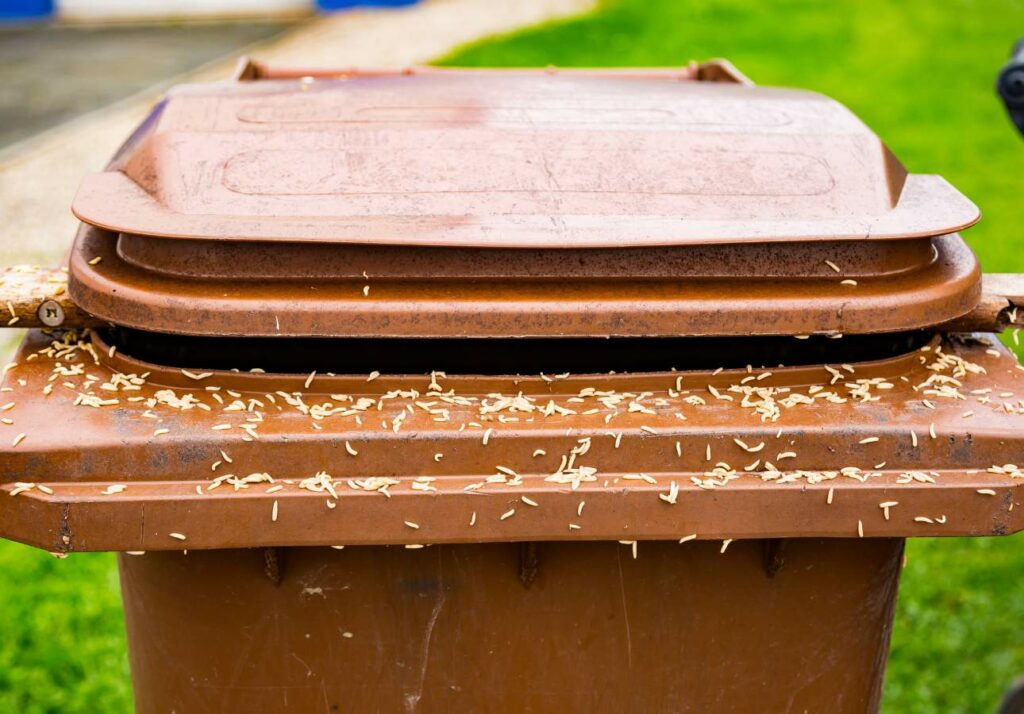
How To Keep Maggots Out Of A Trash Can
Congratulations, you have successfully tackled a maggot infestation! The next thing to think about is how you can prevent flies and maggots from coming back. Follow these preventative measures to help keep maggots out of your trash can and reduce the risk of future infestations.
Clean Your Trash Can Regularly
Getting rid of the flies and maggots does not mean your trash can is thoroughly cleaned. Give it a deep, thorough clean after killing the maggots, and continue to do so at least once a month (more during warm seasons). Use dish soap and water to scrub your trash can clean, both inside and out. Don’t forget to clean the lid, too. After scrubbing, rinse with water using a garden hose, making sure there isn’t any soap residue.
Once clean, leave your trash can to dry under the sun. Use it only once it’s thoroughly dry.
Minimize Food Waste
It’s important to dispose of organic matter promptly because they are the most attractive to flies. Consider using a compost bin to dispose of food waste instead of throwing them in your trash can.
Seal Garbage Bags Securely
Make sure that your garbage bags are tightly sealed even if your garbage bin has a lid so that flies don’t have easy access. Consider using smaller trash bags for kitchen waste or food scraps if you don’t have a compost bin. You can also use a separate garbage can for kitchen waste, preferably a metal trash can with a lid to keep flies away.
Use Essential Oils
Essential oils are truly versatile. I use them a lot for aromatherapy, creating blends for different purposes, from helping ease flu symptoms to making my home smell like summer not matter what season it really is.
Surprisingly, they are also natural repellants for pests – flies and other bugs hate the smell of certain essential oils. Lavender, peppermint, eucalyptus, lemongrass, and bay leaf are excellent insect repellants. Just fill a spray bottle with water, add a few drops of your essential oil, and spray the solution on the inner surface of your garbage bin. Flies and other bugs will surely stay away!
Wrapping Up
Maggots in trash cans surely are a disgusting thing, but thankfully they’re not hard to get rid of. Depending on the size of your garbage bin or the density of maggots present, you can choose from a variety of easy methods to tackle a maggot infestation successfully. This way, you can make sure that maggots and other critters don’t make your garbage bins their residence!
If you learned something new from this blog post, save it for later in case maggots infest your trash can in the future. It would also be awesome if you shared this with family and friends, so they don’t face the same problem!


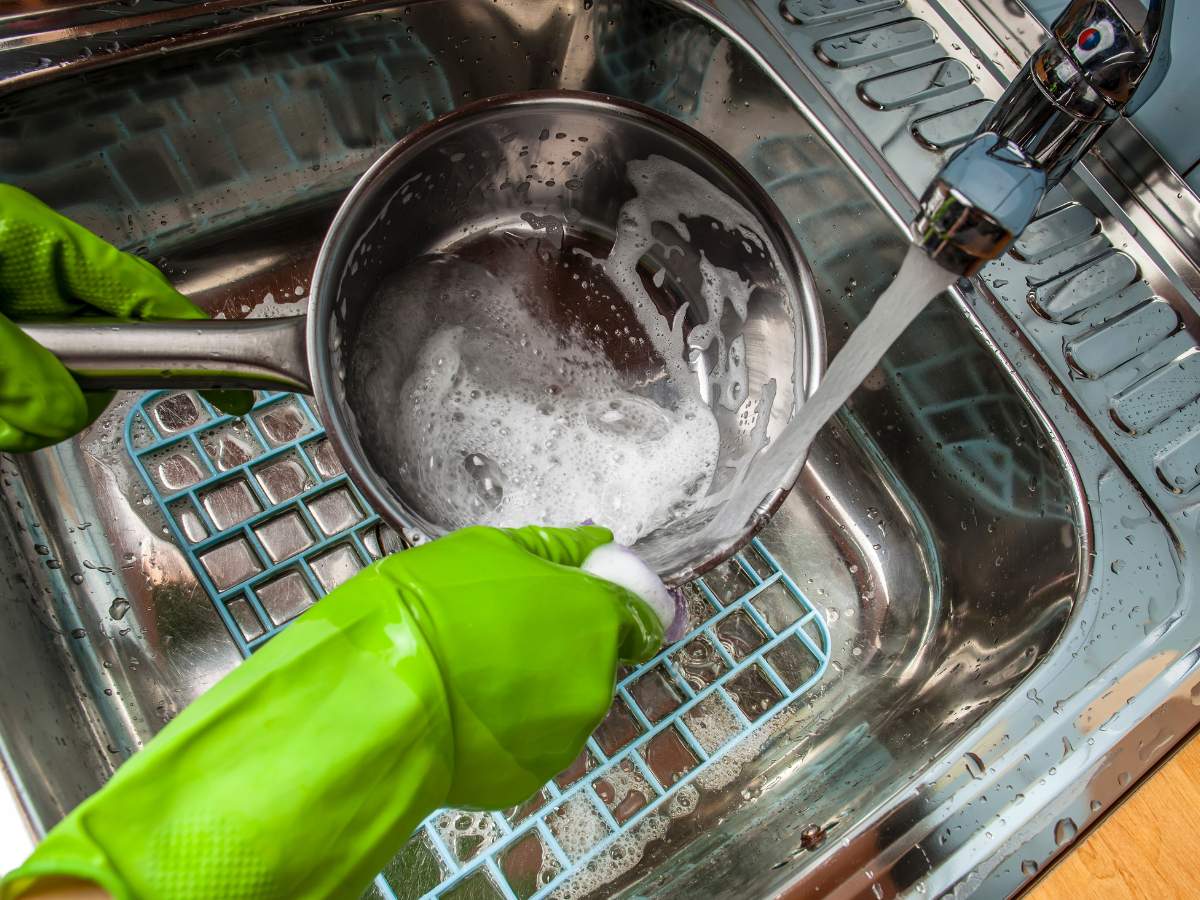




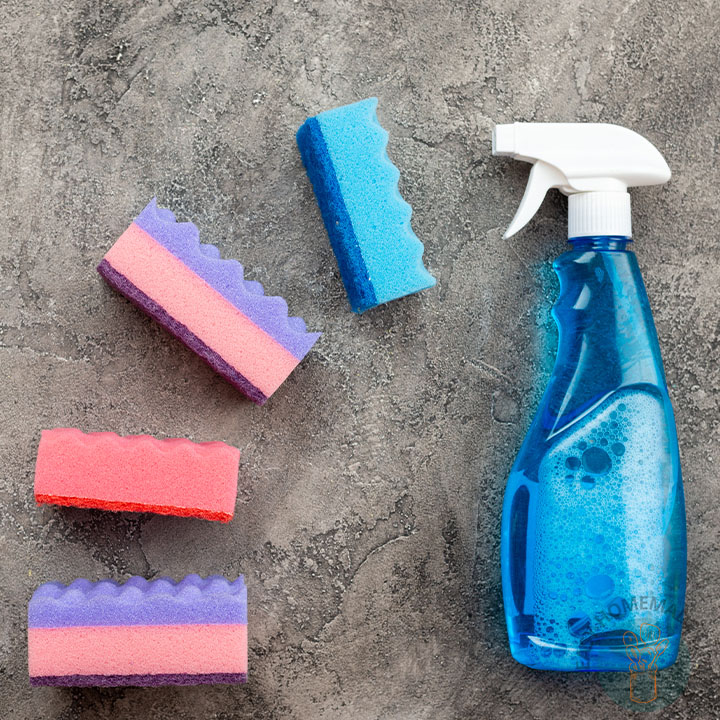
Thanks for the tips! Going to try it now. Appreciate it!
Always a pleasure, Ellise. Thank you for visiting the post. Happy cleaning!